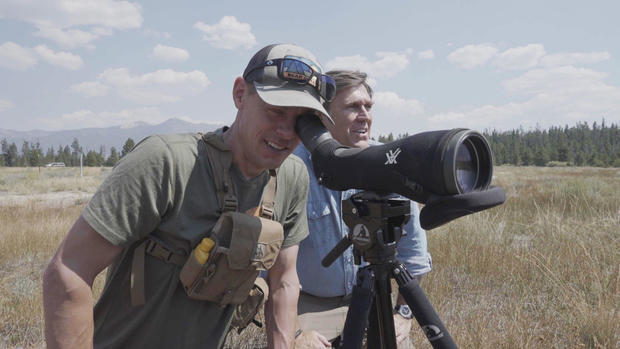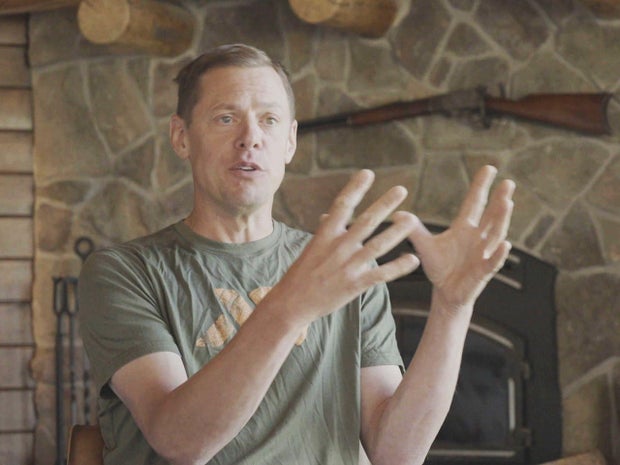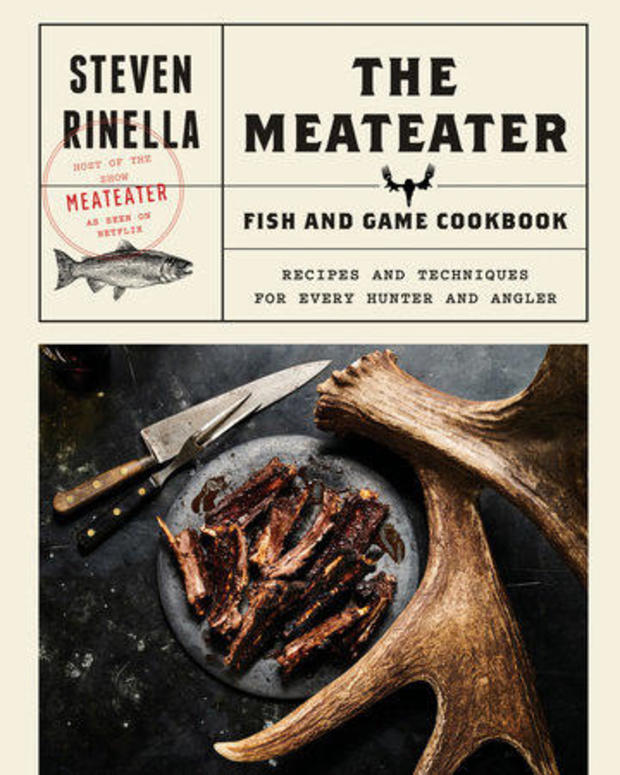“MeatEater” host Steve Rinella, the “Julia Child of the campfire”
In the Sawtooth mountains of Idaho, it took just moments for Steve Rinella and his bow-hunting buddy, Dan, to spot some pronghorn antelope in the distant brush. Cowan tagged along with perhaps one of the most recognizable hunters in all America, though he’d never hunted a day in his life.
“I do what I was born to do, which is what I like,” Rinella said.
He’s the creator and host of the popular TV and web series, “MeatEater,” now in its 11th season. It’s hunting the way a hunter sees it – up close and personal – and for Rinella, hunting is personal. He said, “At my core, I like nature, I like hunting, I like fishing, I like eating the stuff that I hunt and fish for. And I turned that into the work I do.”
CBS News
He came to hunting the way most people do; his father hunted. Back then he saw it largely just as a sport. “When I was 18, I was obsessed with hunting and fishing. I did not know nor use the word conservation. In my mind, all the resources we enjoyed, they fell from the sky … they were there for the taking.”
“And they would always be there for the taking?’ asked Cowan.
“Get yours while the getting’s good.”
CBS News
But today, conservation is at the heart of almost everything “MeatEater” does. The quality of the hunting, he says, is only as good as the health of the population being hunted, be it deer, fish, or anything else. His point is that loving the wild, while still taking a wild animal’s life, are not mutually exclusive. “I’ve never encountered in my life a person who holds wild game in high regard who doesn’t hold wildlife in high regard,” Rinella said. “And they understand that there’s a limit on how much we can pull from it, or you end up dismantling and destroying the whole thing.”
Whether you agree with that or not, it’s nothing new. Charles Darwin, Ernest Hemingway, and John James Audubon all loved nature and hunting. And then there’s Theodore Roosevelt, who especially loved the land. Rinella said, “He saved about 50,000 acres of mountains, plains, woodlands in this country for every day he was in office. Why? He was inspired to do that through a relationship with hunting.”
That same idea – respecting the resource – is what he’s trying to teach his own children, and in part he’s doing it through food.
At his home in Bozeman, Montana, Rinella’s refrigerator is stocked with the frozen spoils of his adventures in the wild: Elk meat, ducks, wild turkey. Everything in here, he says, has a story that brings with it a discussion. “Every night that we eat, we eat something that we grew, that we hunted, that we found out in the woods, that we found in our backyard,” he said. “And there’s not a night goes by, I’m not kidding, there’s not a night goes by that we don’t talk about it.”
His cooking has attracted non-hunting viewers as well. Rinella has become the “Julia Child of the campfire.” The last third of almost every “MeatEater” episode is cooking the day’s catch or kill, in ways that make the woods look like a 3-star Michelin restaurant, like the time he stirred up a stag and pumpkin stew.
Random House
Rinella said, “I’ve read this story dozens of times, there’d be, like, shock: ‘Wow, this chef, this famous chef’ – whatever, name your famous chef! – ‘has become interested in hunting.’ Of course he is. ‘Cause he’s interested in food!”
Rinella’s not trying to convince animal rights advocates to suddenly become hunters themselves. But what he hopes anyone who is interested in the show will come away with is the notion that hunters aren’t always the enemies of animal welfare. “I’m talking to my kind; by that, I mean I’m talking to other, like, outdoorsmen and outdoors women,” he said. “I’m also talking to people who are, like, kicking the tires on this world, who are curious about it. They weren’t curious, they wouldn’t be watching.”
“MeatEater” has now grown into having a lifestyle brand – clothes and products for hunting. He’s written a number of bestselling books, including cookbooks. And he has a top-rated podcast as well. His brand is based on his singular philosophy: that none of us live on the land, we live with it.
For more info:
Story produced by David Rothman. Editor: Emanuele Secci.
See also:
For more latest Education News Click Here




